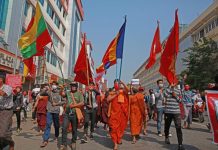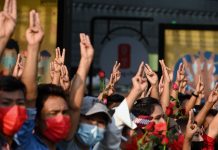
Hong Kong Bar Association reacts to China's national security law, saying it undermines the city-state's independent judiciary and suppresses freedoms.
According to the Hong Kong Bar Association, the national security law wrecks the legal firewall established between Hong Kong's independent judiciary and China's Communist Party-controlled courts since the 1997 handover.
The national security law, which aims to fight secession, subversion, terrorism and colluding with foreign groups, was filed on Tuesday in Beijing. This move bypassed Hong Kong's legislature.
The passage of the law has led to a wave of fear through the city, invited international criticism, and shaken the legal community in a business hub that has become known for its independence and reliability of its courts.
"Widely drawn"
Based on the five-page analysis by the Hong Kong Bar Association, the new national security law's offenses were "widely drawn" and "are capable of being applied in a manner that is arbitrary, and that disproportionately interferes with fundamental rights, including the freedom of conscience, expression and assembly."
"In addition to the total absence of meaningful consultation, lawyers, judges, police and Hong Kong residents were given no opportunity to familiarise themselves with the contents of the new law, including the serious criminal offences it creates, before it came into force," the analysis stated.
"The lawyers' association's claim... that the law lacked meaningful consultation is totally unfounded," said foreign ministry spokesman Zhao Lijian at a routine briefing Thursday.
Moreover, the Bar Association pointed out that the national security law makes clear "suspects can be removed to face trial in Mainland China" and suggests that the process does not bear the usual checks and balances of extradition hearings.
The organization explained the law allowed mainland security agents in Hong Kong to be "above the reach of local law." In addition, it noted that empowering the city's chief executive to assign judges to manage national security cases compromise judicial independence.
Moreover, local police could practice wider surveillance powers to trace suspects, including wiretapping, without legal permission, the association noted.
National security trials
The analysis mentioned that some national security trials could be held behind closed door and that Beijing has final judgment on the interpretation of the new law.
"This gives rise to concern whether this might operate to prohibit mere speech or any peaceful advocacy," the association said.
Terrorists acts have a vague definition, according to the analysis. These may involve people who unknowingly gave material or financial assistance to someone who later went on to take an action that is deemed a terrorist act by nature.
The association noted the vague definition of colluding with foreign forces as it covers "accepting a subsidy or support from a foreign organization with a view to carrying out hostile actions against the (Hong Kong government).
"This gives rise to concern whether certain existing activities of academics, NGOs and media organizations which were lawful or not unlawful in the past might now be outlawed by these provisions," the association said.
The bar association is one of the most respected and influential legal organizations in Hong Kong.






